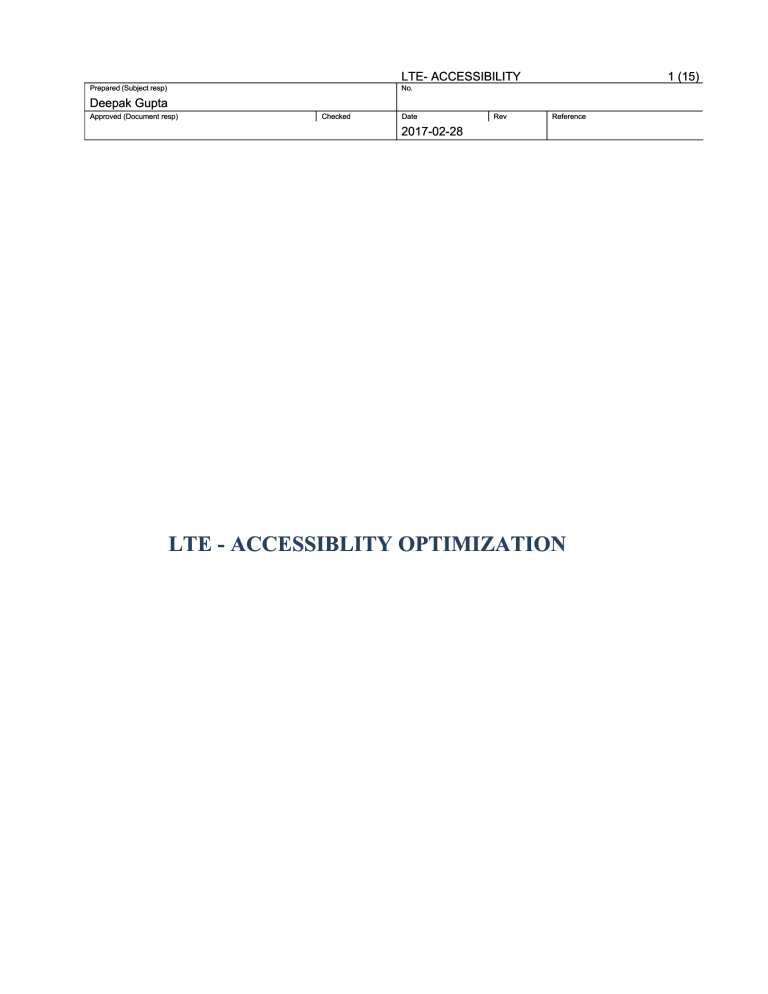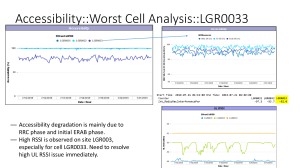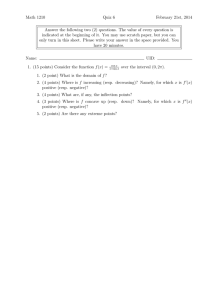
LTE- ACCESSIBILITY Prepared (Subject resp) 1 (15) No. Deepak Gupta Approved (Document resp) Checked Date Rev Reference 2017-02-28 LTE - ACCESSIBLITY OPTIMIZATION LTE- ACCESSIBILITY Prepared (Subject resp) 2 (15) No. Deepak Gupta Approved (Document resp) Checked Date Rev Reference 2017-02-28 The Different Phases of Accessibility Accessibility for the EUTRAN is a measure of the abilit y of a user to obtain an E-RAB from the system. The initial ERAB establishment process can be divided into the following phases: • Random Access • Paging • RRC Connection Establishment • S1 Signalling Connection Establishment • Initial E-RAB Establishment or E-RAB Addition. Note: Pls. note that Phase 1) Random Access & 2) Paging will have effect on end user experience but are not directly reflected in Counter based KPI formula. Considering counter based Accessibility KPI, we have only 3 phases of Accessibility, which are mentioned as below. CSSR Formula:- LTE- ACCESSIBILITY Prepared (Subject resp) 3 (15) No. Deepak Gupta Approved (Document resp) Checked Date Rev Reference 2017-02-28 1) Random Access:The UE uses the random access process to gain access to the cell for the following reasons: Initial access to the network from the idle state – R R C Connection E stablis hment Re-gain access to the network after radio link failure – R R C C onnection R e-es tablis hment During handover to gain synchronization with a new cell – Handover Ex ecution Two types of RA procedures are defined: CBRA (Contention Based Random Access): pmRaAttCbra, pmRaSuccCbra CFRA (Contention Free Random Access): pmRaAttCfra, pmRaSuccCfra Troubleshooting: i) Sleeping Cells: Check whether the cell is a “Sleeping Cell”. Due to their nature Sleeping Cells are difficult to detect and therefore cells in these conditions can remain out of service for long time periods causing major service outages. They do not report standard symptoms of failures in services e.g. hardware or software alarms The Counter pmRaSuccCbra is very low or zero; then the cell is considered a sleeping cell Resolution: Lock/Unlock the cell. Re-Start. ii) Uplink Interference: UL Interference can be either Internal - Interference due to other UE’s in the cell. External- Interference due to power supply sources. Due to UL RSSI, RBS cannot detect/decode the request sent by UE. And so, UL RSSI has a great impact on Accessibility performance. ‘pmRadioRecInterferencePwr’ is the measured Noise and Interference power on PUSCH & ‘pmRadioRecInterferencePwrPucch’ is the measured Noise and Interference Power on PUCCH. These two counters can be used to identify if the noise floor of the cell is higher than it should be. Ideally this counter should be measured at the lowest traffic hours (early morning hours for most), to know the actual noise floor of the cell and perform further investigation to find the root cause for the same. LTE- ACCESSIBILITY Prepared (Subject resp) 4 (15) No. Deepak Gupta Approved (Document resp) Checked Date Rev Reference 2017-02-28 Resolution: Checking Alarms & HW faults in case of high RSSI in low traffic hours(external interference), auditing “pzeronominalpusch” ( -65,-103) & “pzeronominalpucch” (-120,-117)powers if the noise floor is very high during the high traffic hours(internal interference). preambleInitialReceivedTargetPower can be tuned to higher values, if the source of high RSSI is unknown, so that the RACH preamble signal can rise above the noise floor. iii) Preamble Issues: High traffic on a cell can lead to conflicts between UEs and will impact the average call-setup time and user perception. In the current versions for Ericsson system, we cannot increase the RACH capacity, but in future versions, prachconfigurationindex can be tuned to increase the capacity of cell from RACH perspective. Preambles discarded for TA > CellRange: Counter for this is only available for CFRA, however it can be used to have an idea of the performance of CBRA. Counter "pmRaFailCfraMsg1DiscOoc” can be used to find the amount of discards because of TA > Cell-Range. Activating feature “MaximumCellRange” and increasing “CellRange” parameter. RachRootSequence to be tuned accordingly to accommodate 64 preambles. RootSequenceIndex(RachRootSequence) Conflict: RSI hits nearby can lead to conflicts in preambles detection in the concerned cells. RSI should be tuned considering the Cell Range, and the respective difference should be maintained in the potential interfering cells. MTD Signal Traces: UPC_DL_MAC_CE_FI_SCHEDULE_RA_MSG2_REQ : Used to request creation of one RA Msg2 session to be scheduled for a subframe. UPC_DL_MAC_CE_FI_SCHEDULE_RA_MSG2_CFM: Confirmation of above UP_DLMACPE_CI_RA_MSG2_ALLOC_IND: Allocation information for messages on the common channel (TB description, L1 Control Description, RAR Information RACH_All_Traces.txt 2) RRC Connection Establishment:• The RRC connection request message is sent to the eNodeB after the UE has performed initial cell selection and detected the best cell LTE- ACCESSIBILITY Prepared (Subject resp) 5 (15) No. Deepak Gupta Approved (Document resp) Checked Date Rev Reference 2017-02-28 • The RRC connection establishment is always initiated by the UE but can be triggered by either the UE (Mobile Originated) or the network (Mobile Terminated). The network triggers the RRC connection establishment procedure by paging the UE. RRC Setup Failure [%] = 100*(pmRrcConnEstabAtt-pmRrcConnEstabSucc) / (pmRrcConnEstabAtt) Troubleshooting i) Access fail due to overloading & High Loading : The eNodeB may block the UE’s connection request by sending the “RRC Connection Reject”, there will be no cause value signaled to the UE with RRC Connection Rejects. Counters “pmRrcConnEstabFailHighLoad” & “pmRrcConnEstabFailOverload” will be stepped at transmission of “RRC Connection Reject” during high load or overload circumstances. Resolution:Change SC 556(numInitialAccessAndIncomingHo): Increase the maximum number of initial accesses and incoming handovers that are allowed during a time window without triggering the load control mechanism. (Comments) Change EutranCellFDD.qRxLevMin to higher values, if the coverage is not an issue. Change EutranFreqRelation.qOffsetCellEUtran: enable faster cell re-selection from loaded cells towards other surrounding cells that satisfy the cell selection criteria. ii) Access fail due to license Issue: The number of failed-RRC-Connection-Establishments that are rejected due to lack of CUL (Connected User License) are counted with the pmRrcConnEstabFailLic. Resolution: pmRrcConnEstabFailLic pegs only when the grace period(gracePeriodAvailable) has ended, and during the duration when grace period is active, eNodeB is allowed to accept maximum number of UEs(limited by DUL/eNB version). This can be found out using pmLicConnectedUsersMax and the new license limit should be adjusted accordingly. iii) RF Issues: Radio i include radio interference, imbalance between the uplink (UL) and downlink (DL) quality, weak coverage and the UE does not use the maximum transmit power. During an RRC connection setup process, the eNodeB has not received any RRC connection setup complete messages within the related timeout duration. LTE- ACCESSIBILITY Prepared (Subject resp) 6 (15) No. Deepak Gupta Approved (Document resp) Checked Date Rev Reference 2017-02-28 At the eNodeB side, both the RRC connection setup success rate and the E-RAB setup Success rate are low. To be investigated: Radio Interference: DL interference from neighboring cells, DL interference from external systems, and UL interference need to be investigated. The counters that can be used to find out the same are: pmSinrPucchDistr, pmSinrPuschDistr, pmRadioUeRepCqiDistr, pmRadioTxRankDistr, pmRadioRecInterferencePwrPucch. eg: PUCCH received power should be around the pZeroNorminalPucchPwr (default:-117 dBm) “pmRadioTbsPwrRestricted” Cell coverage issues can be detected using & “pmbadcovevalreport”. UEs trying to access the network in poor Downlink RF conditions can be determined by looking for high pegs in “pmRrcConnEstabAttReatt”. Resolution:- Tuning pZeroNorminalPucchPwr depending on the values from pmRadioRecInterferencePwrPucch Tuning t300 in cases where, the radio conditions can be improved much and immediate results are required in the success rate. Change EutranCellFDD.qRxLevMin to higher values, if the coverage is not an issue. Change EutranFreqRelation.qOffsetCellEUtran: enable faster cell re-selection towards better cells. iv) CCE Capacity:- LTE- ACCESSIBILITY Prepared (Subject resp) 7 (15) No. Deepak Gupta Approved (Document resp) Checked Date Rev Reference 2017-02-28 pmPdcchCceUtil will give idea if high CCE utilization led to degradation in RRC Success Rate. If the last bucket has high number of samples in the degraded hours, then surely problem is due to lack of CCE resources. Resolution: Tuning pdcchCfiMode to the optimum value of 5(dynamic, max=3) can get best utilization of the CCE resources with required control dimensioning.(pdcchLoadTarget) L3 Traces: te e all Ft_RRC_CONN_SETUP: Will printout out L3 messages related to the RRC Setup as well as internal information of the triggered procedures and detailed info on failure cases CTR Trace: INTERNAL_PROC_RRC_CONN_SETUP: Generated for the RRC Connection Setup procedure to establish an RRC Connection. Contains information about the request and result. 3) S1 Connection Establishment. • When setting up the E- RAB the ‘RRC CONNECTION SETUP COMPLETE’ message contains a piggybacked NAS ‘Attach Request’ message. The RBS will send this message to the MME in the S1AP ‘INITIAL UE MESSAGE’ and increment the ‘pmS1SigConnEstabAtt’ counter as illustrated below. LTE- ACCESSIBILITY Prepared (Subject resp) 8 (15) No. Deepak Gupta Approved (Document resp) Checked Date Rev Reference 2017-02-28 Counters:pmS1SigConnEstabAtt pmS1SigConnEstabSucc Troubleshooting MME overload can lead to s1 connection failures and this can be found using the pmS1SigConnEstabFailMmeOvlMos counter. Investigation from MME end would be required in this case. Using “st termpointtomme” status of connected MME can be checked, whether all are up and running, as if one is inactive, the load will be on the other MME’s i n the pool. LTE- ACCESSIBILITY Prepared (Subject resp) 9 (15) No. Deepak Gupta Approved (Document resp) Checked Date Rev Reference 2017-02-28 Find out if the degradation is from a certain hour, if yes, try to find out if any restarts or any alarms on the node are evident from the logs. Resolution: Restarting the node. Locking and Unlocking the cell. Locking and unlocking the termpointtomme with the problematic MME. TE Trace: te e all Ft_S1AP_ASN: Will printout out messages related to the S1AP Setup as well as internal information of the triggered procedures and detailed info on failure cases. CTR trace: INTERNAL_PROC_S1_SIG_CONN_SETUP: Generated for the S1 Signaling Connection Setup procedure to establish an S1 Signaling Connection. Contains information about the request and result. Eg: Enabling and decoding the S1AP_ASN traces will show us the cause of an S1 Setup failure. In the below case, an incorrect PLMN id is defined (ENodeBFunction and EUtranCellFDD MOs). 4) E-RAB Establishment:A. Initial E-RAB Establishment • The Initial Context Setup procedure is triggered by the MME by sending the INITIAL CONTEXT SETUP REQUEST. This message includes information regarding the default E-RAB to set up LTE- ACCESSIBILITY Prepared (Subject resp) 10 (15) No. Deepak Gupta Approved (Document resp) Checked Date Rev Reference 2017-02-28 • • The eNodeB allocates resources for the first Data Radio Bearer (DRB). The eNodeB configures the UE by sending message RRC CONNECTION RECONFIGURATION The UE responds with RRC CONNECTION RECONFIGURATION COMPLETE and the procedure is completed after the eNodeB has sent INITIAL CONTEXT SETUP RESPONSE to the MME. Counters: pmErabEstabAttInit pmErabEstabSuccInit B. Added E-RAB Establishment • • • The added bearer is established if the user requires different QoS of that offered by the initial bearer, or if the user requires connectivity to different PDN. Added bearers are configured to run in parallel to the existing initial bearer The added bearer establishment procedure is initiated by the network but may be requested by the UE The eNodeB uses the E-RAB Setup Request to configure itself for the added bearer. The RRC Connection Reconfiguration message provides the UE with information necessary to configure the added bearer. Counters:pmErabEstabAttAdded pmErabEstabSuccAdded LTE- ACCESSIBILITY Prepared (Subject resp) 11 (15) No. Deepak Gupta Approved (Document resp) Checked Date Rev Reference 2017-02-28 i) License for no. of ERAB's per user: pmErabEstabFailInitLic/pmErabEstabFailAddedLic Gives the total number of license rejects depending on the configuration on the eNodeB like “ Multiple Radio Bearer per user”. ii) UL /DL GBR resources overload: pmErabEstabFailGbrDlEnb & pmErabEstabFailGbrUlEnb gives the total number of failed initial E-RAB setup attempts due to downlink/Uplink GBR overload for transport network resources. zzzTemp20 / zzzTemp21 are the parameters used to configure Uplink and Downlink admission thresholds respectively. Check if they are set to default values, else tuning will be required depending on the capacity and requirement. Also an audit of various Admission Control parameters can be carried out LTE- ACCESSIBILITY Prepared (Subject resp) 12 (15) No. Deepak Gupta Approved (Document resp) Checked Date Rev Reference 2017-02-28 iii) eNodeB Issue With regards to hanging resources in eNb – a restart normally helps. With regards to faulty RRU’s – if restarting the RRU doesn’t help, replacing the RRU is the option. To find out particular UE issue, We ne ed to analyze CTR (Cell Traces) & EBM (MME). iv) RF Issues: Radio issues include radio interference, imbalance between the uplink (UL) and downlink (DL) quality, weak coverage and the UE does not use the maximum transmit power. During an RRC connection setup process, the eNodeB has not received any RRC connection setup complete messages within the related timeout duration. At the eNodeB side, both the RRC connection setup success rate and the E-RAB setup Success rate are low. To be investigated: Radio Interference: DL interference from neighboring cells, DL interference from external systems, and UL interference need to be investigated. The counters that can be used to find out the same are: pmSinrPucchDistr, pmSinrPuschDistr, pmRadioUeRepCqiDistr, pmRadioTxRankDistr, pmRadioRecInterferencePwrPucch. eg: PUCCH received power should be around the pZeroNorminalPucchPwr (default:-117 dBm) “pmRadioTbsPwrRestricted” Cell coverage issues can be detected using & “pmbadcovevalreport”. UEs trying to access the network in poor Downlink RF conditions can be determined by looking for high pegs in “pmRrcConnEstabAttReatt”. LTE- ACCESSIBILITY Prepared (Subject resp) 13 (15) No. Deepak Gupta Approved (Document resp) Checked Date Rev Reference 2017-02-28 Resolution:- Tuning pZeroNorminalPucchPwr depending on the values from pmRadioRecInterferencePwrPucch Tuning t300 in cases where, the radio conditions can be improved much and immediate results are required in the success rate. Change EutranCellFDD.qRxLevMin to higher values, if the coverage is not an issue. Change EutranFreqRelation.qOffsetCellEUtran: enable faster cell re-selection towards better cells. v) CCE Capacity: pmPdcchCceUtil will give idea if high CCE utilization led to degradation in RRC Success Rate. If the last bucket has high number of samples in the degraded hours, then surely problem is due to lack of CCE resources. Resolution: Tuning pdcchCfiMode to the optimum value of 5(dynamic, max=3) can get best utilization of the CCE resources with required control dimensioning. L3 Traces: te e all Ft_ERAB_SETUP - Will printout out L3 messages related to the ERAB setup as well as internal i nformation of the triggered procedures and detailed info on failure cases. CTR Trace: INTERNAL_PROC_ERAB_SETUP: Generated for the ERAB setup procedure to establish additional ERABs. Contains information about the request and result. LTE- ACCESSIBILITY Prepared (Subject resp) 14 (15) No. Deepak Gupta Approved (Document resp) Checked Date Rev Reference 2017-02-28 5) Paging :- i. S1 Paging % S1 Paging discard rate: shows the discard rate of paging messages due to max intensity of incoming S1AP Paging messages are forwarded to the eNodeB. % S1 Paging discard rate = 10 0 * pmPagS1Discarded / pmPagS1Received ii. Paging Discards by Cell:After the S1AP Paging message is correctly received and not discarded by RBS, it is routed to one cell (pmPagReceived). An S1AP Paging message discarded as part of pmPagS1Discarded will not cause this counter to be pegged. When the cell fails to broadcast an RRC Paging within a certain time (pagingDiscardTimer), e.g. due to congestion, the Paging is discarded and counter pmPagDiscarded is incremented by the number of included Paging Records in the discarded Paging message. pagingDiscardTimer(3s): The length of time a received paging is retained or queued in the RBS before it is discarded. The timer should be set to the same (or smaller) value as the paging resend timer in MME (T3413). This setting prevents the RB S from retaining or sending an old paging after the re-sent copy is received from the MME. . %Cell Paging discard rate = 100 * pmPagDiscarded / pmPagReceived iii. S1 Issues with the MME(MME Codes) There can be issues where the paging attempts have reduced to Zero. A restart can help in that case. LTE- ACCESSIBILITY Prepared (Subject resp) 15 (15) No. Deepak Gupta Approved (Document resp) Checked Date 2017-02-28 Rev Reference



